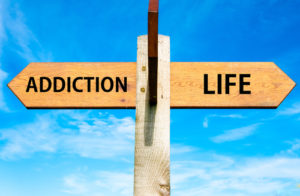By: Design for Change Recovery
Categories:
Is Addiction A Choice?
You are here:We experience a lot of things in life we didn’t necessarily choose. In many ways, we might have set yourself up for it. Despite the warnings of others, we might have chosen to walk right into something that had a pretty high likelihood of happening. We chose the circumstances and we chose to take the risk. Some would argue that means we chose the outcome. Some would say anything is possible when you leave things up to chance. In other ways, we never see it coming. We do things we truly think are normal, harmless, and couldn’t possibly go wrong. We choose what we are doing and are surprised by the result. Did we choose the result willingly? Subconsciously? Unconsciously? It’s hard to say. We can recognize we only have so much choice in the matter when it comes to a lot of things in life. On this, most people can agree.
That is, until, we mention drug and alcohol addiction. When we start to talk about the power and role of choice in regards to addiction, we start to talk about whether or not addiction is a choice. A pervasive belief about addiction is that it is a choice. By choosing to do drugs, by choosing to drink alcohol, addicts and alcoholics choose to become addicted. Addicts and alcoholics choose not to stop. They choose to continue hurting themselves and the ones they love.
People choose to ride motorcycles. They choose the risks that come with flying down highways protected by nothing more than some clothes and a helmet, if they choose to wear one. When someone has a motorcycle accident, do bystanders do nothing? Do paramedics show up and say, you chose this because you chose to ride a motorcycle, therefore, you don’t deserve to be helped. People will most certainly have their judgments and even cast shame, but, they’re going to make sure someone in a motorcycle accident gets the treatment they need. There’s a good chance the motorcycle rider will get back on their motorcycle. There’s a good chance they won’t. It’s their choice.
Addiction is a similar story. It is true- people choose to recreationally experiment with drugs and alcohol. They choose to get drunk and they choose to get high. Even after they become addicted and their life starts to unravel, they get physically sick, their friends and family tell them to stop- they still choose to use. Somewhere in the process of addiction, however, the way in which an addict or an alcoholic chooses gets lost. Research has found that non-dependent cocaine users have a stimulated response to cues of using cocaine after just one or two times using it, for example. That means even though those individuals aren’t choosing to continue using cocaine, their brain continues to crave it. Stories from the opioid epidemic have revealed that people can grow chemically dependent on narcotic painkillers after just a few uses, as prescribed by their doctor. Drugs and alcohol change the way the brain thinks, makes decisions, considers negative consequences, and conceptualizes long term circumstances. Put simply, drug and alcohol addiction changes the way the brain chooses. For example, chemical dependency changes the way the midbrain prioritizes its orders of survival operations. Instead of eating and sleeping being vital to survival, using drugs and alcohol is.
Unfortunately, people hold addiction against those who are addicted. When someone overdoses on drugs and tries to seek treatment, they are often told by society and by law that they don’t deserve it, because they chose to become addicts. Few people choose to become addiction. The addiction happens and they are challenged in choosing to stop.
What addicts and alcoholics are empowered to do is choose to recover. For one brief moment of clarity, they are able to make a call for help, check into detox, enroll in a treatment program, and choose recovery. That choice is always there, when they are able to remember they can choose it.
Choose sobriety. Choose treatment. Choose freedom. Choose hope. Design For Change is an excellent choice to fit a variety of treatment and recovery needs from full time residential programs to part time programs tailored to college students. For information, call us today at (877) 267-3646.



